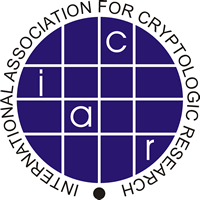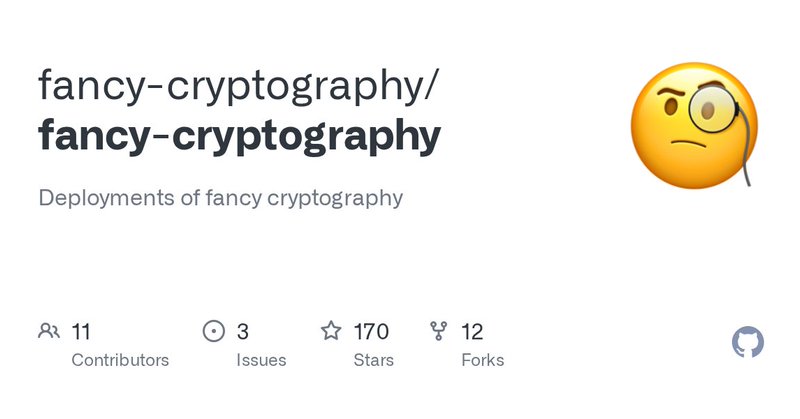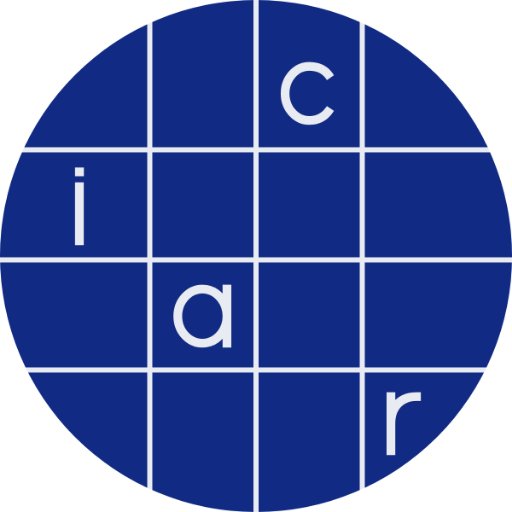
Guru Vamsi Policharla
@gvamsip
Followers
337
Following
791
Media
1
Statuses
27
CS PhD @UCBerkeley
Berkeley, CA
Joined March 2021
1/ Excited to announce that @gvamsip, @xosmig, @XiangZhuolun and I have a new paper on building a high-performance mempool for Aptos, which runs directly on the Aptos validators: https://t.co/khHo8zZAGX. The paper has several cool ideas:
eprint.iacr.org
MEV (Maximal Extractable Value) remains one of the most corrosive forces in blockchain systems, enabling frontrunning, sandwiching, and other manipulations that directly exploit users. The core...
8
15
48
Spoiler: We (obviously) don't get WE for all NP Languages. Our framework was published at CRYPTO 2025 ( https://t.co/5Mwubz8HB7). Joint work with @SanjamGarg, Mohammad Hajiabadi, Dimitris Kolonelos, and @abhiramko. Thanks to @Arka_r_c and @MingyuanWang0 for review and feedback.
eprint.iacr.org
Witness Encryption (WE) is a powerful cryptographic primitive, enabling applications that would otherwise appear infeasible. While general-purpose WE requires strong cryptographic assumptions, and is...
0
0
1
To highlight how the framework can be used, we'll work through concrete examples. I've set up small exercises along the way, so grab a scratchpad! In the end, you'll recover Silent Threshold Encryption! + develop a much better understanding of "advanced" encryption schemes
1
0
1
Excited to share our framework for building *concretely efficient* witness encryption schemes. Think of an analogue of Circom/Noir but for Witness Encryption. That's our framework. (See GIF) More details here: https://t.co/vFYtSLPspt
1
4
13
How to Remove the Relay? MEV-Boost Relays are a source of centralization for Ethereum, but they provide valuable privacy and safety to builders and proposers. @gvamsip and I show how to use his novel "silent" threshold encryption scheme, combined with ZK or TEEs. (link below)
11
31
177
We're crowdsourcing a list of mainstream uses of "fancy" cryptography such as OPRFs, blind signatures, SNARKs and ZKP. Basically cryptography beyond symmetric ciphers, hashes, signatures, and KEM/PKE. https://t.co/HnBYEpMV8a
github.com
Deployments of fancy cryptography. Contribute to fancy-cryptography/fancy-cryptography development by creating an account on GitHub.
5
41
132
2
0
10
Typically, a committee of n parties requires O(nB) communication to decrypt B ciphertexts. One message per party, per ciphertext. In contrast, we only need O(n) communication. Useful for encrypted mempools, where an entire block needs to be decrypted quickly.
1
1
13
2. Batched Threshold Encryption (USENIX Security 2024 - https://t.co/ztiDGyXj45): A “batch” of ciphertexts can be decrypted using communication that is *independent* of the batch size.
eprint.iacr.org
With the rising popularity of DeFi applications it is important to implement protections for regular users of these DeFi platforms against large parties with massive amounts of resources allowing...
2
2
22
Parties sample their public-key pair *independently* but need a KZG CRS. To encrypt, you just need to download the committee's public keys + threshold can be chosen at the time of encryption. Also gives us timelock encryption with a silent setup. Concretely efficient!
1
1
16
Excited to share two new threshold encryption schemes. More details here: https://t.co/kXFrEcV2AL 1. Silent Threshold Encryption (CRYPTO 2024 - https://t.co/x7R1JahczZ): The first scheme to completely avoid interactive setup without using iO/WE.
eprint.iacr.org
We build a concretely efficient threshold encryption scheme where the joint public key of a set of parties is computed as a deterministic function of their locally computed public keys, enabling a...
7
38
179
How can cryptography help with AI regulation compliance? I thought you’d never ask. Guru Vamsi Policharla has answers and they involve zero-knowledge proofs.
1
2
3
@gvamsip is giving a talk on ZKPs of training (ZkPOT) at #realworldcrypto on Mar 27 (W), 9:15-9:30. See talk details below. This is a super interesting research direction. This talk is based on our recent paper in @acm_ccs 2023 ( https://t.co/vwYRTVERSe) Session details:
eprint.iacr.org
How can a model owner prove they trained their model according to the correct specification? More importantly, how can they do so while preserving the privacy of the underlying dataset and the final...
0
1
5
Excellent piece in @mtlaiethics by Guru on our work on zero knowledge proofs of training (zkPOT). I really like that he connected zkPOT to the legal landscape. A paper on this appeared at CCS last month. Go Guru! https://t.co/JzCNqBmknp
montrealethics.ai
🔬 Research Summary by Guru Vamsi Policharla, a computer science PhD student at UC Berkeley. [Original paper by Sanjam Garg, Aarushi Goel, Somesh Jha, Saeed Mahloujifar, Mohammad Mahmoody…
0
3
12
#ePrint $\mathsf{zkSaaS}$: Zero-Knowledge SNARKs as a Service: S Garg, A Goel, A Jain, GV Policharla, S Sekar
eprint.iacr.org
A decade of active research has led to practical constructions of zero-knowledge succinct non-interactive arguments of knowledge (zk-SNARKs) that are now being used in a wide variety of applications....
0
3
4
The video's up! https://t.co/LtIf3N5q7i
Join Vamsi Policharla's talk on post-quantum privacy pass via anonymous credentials at Real World Crypto! Learn about a generic instantiation of a post-quantum anonymous credential scheme with arbitrary predicate support using zero-knowledge proofs. #realworldcrypto
1
2
13
Want to know how to make Dilithum ZKP friendly? Check this: https://t.co/M6Knxqmdx3 Joint work with @bwesterb @gvamsip @__caw__
#realworldcrypto #zkp #crypto
eprint.iacr.org
It is known that one can generically construct a post-quantum anonymous credential scheme, supporting the showing of arbitrary predicates on its attributes using general-purpose zero-knowledge proofs...
0
1
6
Join Vamsi Policharla's talk on post-quantum privacy pass via anonymous credentials at Real World Crypto! Learn about a generic instantiation of a post-quantum anonymous credential scheme with arbitrary predicate support using zero-knowledge proofs. #realworldcrypto
0
2
6












